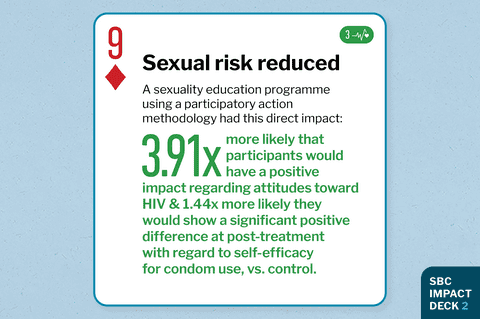Time to read
less than1 minute
Sexuality Education - Reduced Sexual Risk

Strategy researched Sexuality education programme using a participatory action methodology to reduce sexual risk behaviours Impact achieved Country of study Colombia Research methodology Cluster RCT Journal Journal paper title and link Effects of a Sexual Risk-Reduction Intervention for Teenagers: A Cluster-Randomized Control Trial "In the short term, the experimental group showed increased knowledge about HIV and other STIs, sexual assertiveness, self-efficacy, greater behavioral intention toward condom use, and more favorable attitudes toward HIV and condom use than the control group. After 6 months, most psychological and health variables also showed a significant positive change." |
